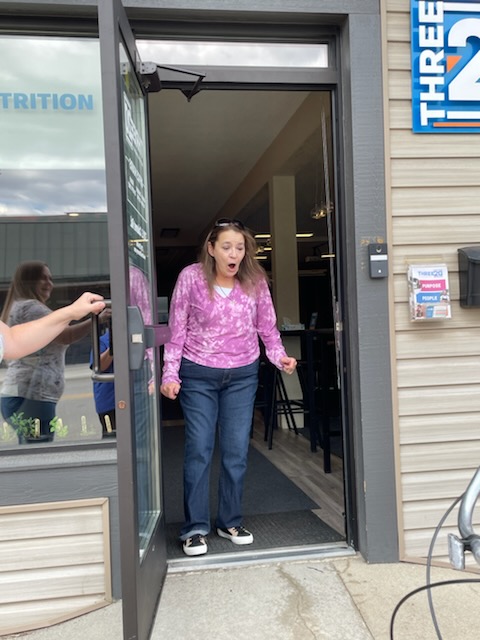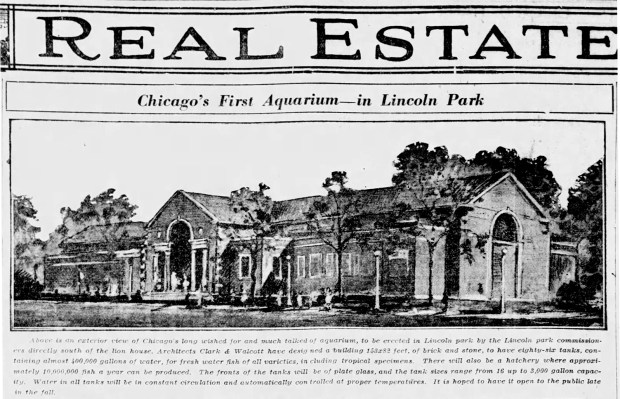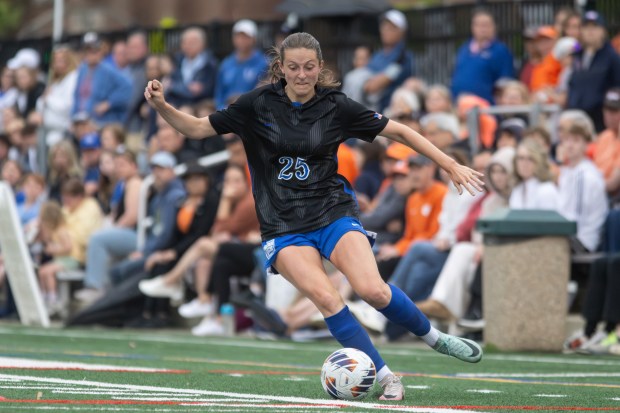Bobi Howard is grateful for the adult tricycle the Porter County Health Department gave her. “It was really hard for me to get rides” to doctor appointments, grocery stores and other vital destinations, she said.
The health department has given away about 50 bikes since the program began last year but these are for those who truly need them.
Recipients have to be at least 15 years old with a low income and truly need them to get around. Care Coordinator Carrie Honeycutt said she gets referrals from shelters, senior living places and elsewhere.
No other recipient has been given a tricycle. Howard’s balance isn’t good enough to manage a bicycle, she and Honeycutt said.
“I was thrilled” to get the tricycle, Howard said. “I didn’t realize they had adult tricycles.”
“She doesn’t have a name, but it’s a girl,” Howard said of her tricycle.
Howard was one of the first recipients last year. “At first, I’d have to ride and stop and push it up a hill,” she said. After about a month, though, she was in better shape.
“Going to the free food places, that helps a lot,” Howard said.
Howard, who has been an avid supporter of Three20 Recovery in Chesterton, said she would ride with her AA sponsor. “Physically, I couldn’t walk here if I wanted to,” she said. Her home was a mile away. “Now, I ride it for recreation.”
“It’s peaceful. It really helps my mental health,” Howard said. Honeycutt said she has seen Howard’s physical health improve, too. “I lost a lot of weight” while using the tricycle, Howard said.
With the tricycle, she’s able to ride alongside her 5-year-old niece, who uses her own tricycle. Bicycles aren’t good at starting and stopping often, but tricycles are, Howard explained. “Under a certain speed on a bicycle, I’d fall over.”
At the end of summer, someone bought her a headlight for the tricycle so she can ride it safely. She has lights on the rear of the tricycle as well as reflectors.
Honeycutt stresses safety when she gives away bicycles. “I know a gentleman who put lights on it and blinged it up,” she said.
Whenever she gives away a bicycle, she spends 20 to 30 minutes with the person, making sure the helmet fits properly and working with them on traffic rules and safety tips.
“Don’t wear headphones so you can hear your surroundings,” she tells riders. Beware of car doors opening, too, because drivers might not be aware of their surroundings. Distracted drivers can be a problem, too.
Valparaiso is easier to get around than some cities, Honeycutt said, because it has so many bike lanes, especially downtown, and sidewalks. Portage, which has a lot of highways and doesn’t have as many sidewalks, isn’t as bike-friendly, she said.
Honeycutt gets referrals from some areas with busy streets. “Do you know of a way to get to a safer road or sidewalks,” she asks when evaluating applicants. People who live in the country might be too far away from essential services to get there safely by bicycle, she said. “Everybody’s circumstance is different.”
Each recipient gets a helmet and bike lock along with the bicycle. A basket affixed to the front or back helps carry groceries and other essentials.
Each bike is also outfitted with a bar code in case it’s lost or stolen, but the bikes belong to the recipient, not the health department. That gives the recipients a sense of ownership.
“It’s so much more than a free bike,” Honeycutt said. It’s a way to get to work, a doctor’s office, a relative’s house, a worship service, a food pantry or the library. It’s a lifeline.
Honeycutt works with Leo’s Mobile Bicycle Service to provide the bikes. “They’re really expensive brand new,” she said.
She also works with the International Order of Odd Fellows chapter headed by County Councilman Greg Simms. That group has an annual bicycle event, including giving some away. The Odd Fellows take bike donations, make sure they’re in good working order and give them away.
The majority of the bikes Honeycutt has given away go to people who are unhoused, often living at a shelter or sleeping on a friend’s couch, she said. Honeycutt also works with clients to make sure they’re aware of other social services available to them.
Most recipients report that they’re using their bikes four or five days a week, she said.
Doug Ross is a freelance reporter for the Post-Tribune.





